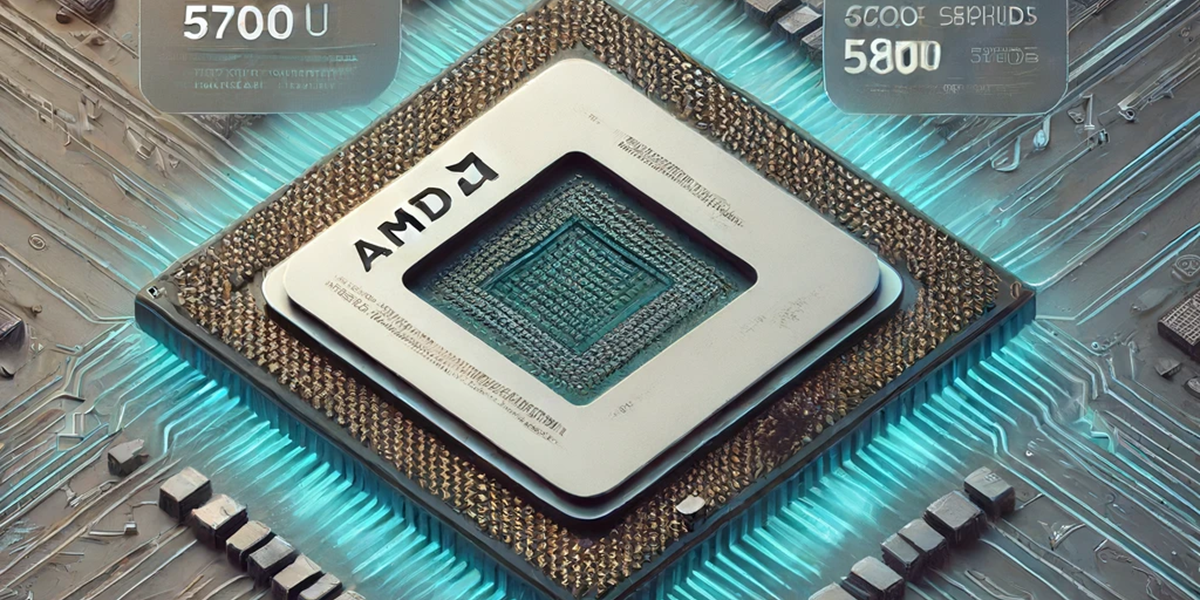AMD Ryzen 7 5700U vs. AMD Ryzen 7 5800HS: Which Processor is Right for You?

Discover the key differences between the AMD Ryzen 7 5700U and the AMD Ryzen 7 5800HS. Whether you're looking for efficient performance or high-end computing power, this comparison will help you decide which processor suits your needs best.
When it comes to choosing a powerful yet efficient processor for your laptop, AMD offers some of the best options in the market. The AMD Ryzen 7 5700U and the AMD Ryzen 7 5800HS are two popular choices among users. In this blog, we will delve into their specifications, performance benchmarks, and ideal use cases to help you determine which processor is the perfect fit for your computing needs.
AMD Ryzen 7 5700U vs. AMD Ryzen 7 5800HS
Both the Ryzen 7 5700U and Ryzen 7 5800HS are designed for laptops, but they target different segments of the market, with differences in performance, power consumption, and use cases. Here's a detailed comparison:
AMD Ryzen 7 5700U
- Architecture: Zen 2 (Not Zen 3 like the 5800HS)
- Process Technology: 7nm
- Cores/Threads: 8 cores / 16 threads
- Base/Boost Clock: 1.8 GHz / 4.3 GHz
- Cache: 12MB (4MB L2 + 8MB L3)
- TDP (Thermal Design Power): 15W (configurable up to 25W)
- Integrated Graphics: Radeon Graphics (Vega-based)
Use Case and Pros:
- Use Case: Ideal for ultrabooks and thin, light laptops where power efficiency and battery life are more critical than raw performance.
- Battery Life: Lower TDP means better battery life, making it suitable for portable devices.
- Performance: Good for everyday productivity tasks, moderate multitasking, light gaming, and media consumption.
AMD Ryzen 7 5800HS
- Architecture: Zen 3
- Process Technology: 7nm
- Cores/Threads: 8 cores / 16 threads
- Base/Boost Clock: 2.8 GHz / 4.4 GHz
- Cache: 20MB (4MB L2 + 16MB L3)
- TDP (Thermal Design Power): 35W
- Integrated Graphics: Radeon Graphics (Vega-based)
Use Case and Pros:
- Use Case: Designed for high-performance laptops and gaming laptops where higher performance is needed, but some power efficiency is still desired compared to the standard H-series.
- Performance: Higher base and boost clocks, larger cache, and Zen 3 architecture offer significantly better performance for demanding tasks like software development, gaming, content creation, and multitasking.
- Efficiency: Balances performance and power consumption, suitable for powerful yet relatively efficient laptops.
Key Differences
-
Architecture:
- Ryzen 7 5700U: Zen 2 architecture.
- Ryzen 7 5800HS: Zen 3 architecture, which offers better performance per watt and improved instructions per clock (IPC).
-
Clock Speeds:
- Ryzen 7 5700U: Lower base and boost clock speeds.
- Ryzen 7 5800HS: Higher base and boost clock speeds, resulting in better overall performance.
-
Cache:
- Ryzen 7 5700U: Smaller cache (12MB).
- Ryzen 7 5800HS: Larger cache (20MB), which contributes to better performance, especially in data-intensive tasks.
-
Power Consumption:
- Ryzen 7 5700U: Lower TDP (15W), leading to better battery life.
- Ryzen 7 5800HS: Higher TDP (35W), but still relatively power-efficient for its performance class.
Recommendation
-
Ryzen 7 5700U: Choose this if you need a highly portable laptop with excellent battery life and decent performance for everyday tasks, light development work, and media consumption. Ideal for ultrabooks and thin, light laptops.
-
Ryzen 7 5800HS: Opt for this if you need higher performance for demanding tasks like software development, gaming, content creation, and heavy multitasking. Suitable for high-performance laptops that still offer good efficiency compared to full H-series processors.
For your use case involving web and mobile development, if you prioritize portability and battery life, the Ryzen 7 5700U is a good choice. However, if you need more robust performance for heavier development tasks and possibly some gaming, the Ryzen 7 5800HS would be the better option.
Join Our Community
Your contributions help us continue creating valuable content. Consider supporting us by sharing our content.
Junagadh, Gujarat
Latest Blog Posts